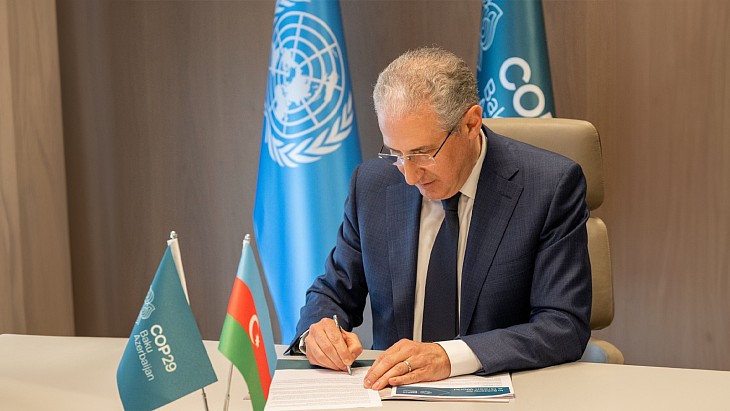In a letter to parties and constituencies Babayev has set out the principles to focus on "to present the COP29 Presidency’s vision to enhance ambition and enable action, outline the key presidency milestones, lay out the pathways that we must follow to turn our vision into a reality, and highlight collaborative networks for complementary action".
He says: "Growing geopolitical tensions and uncertainty in the international environment must not distract us from the imperative to collaborate and address climate change as the greatest transnational challenge of the century ... our actions should be guided by the latest science and informed by the outcomes of the Global Stocktake, agreed by Parties at COP28, with its roadmap for keeping 1.5°C within reach, while leaving no one behind."
He adds: "All countries must strive for the highest possible ambition, in line with the Paris Agreement and informed by the Global Stocktake. We also know that support for developing countries will allow for higher ambition in their actions. We now need to increase the overall flow of climate finance substantially and help developing countries that need support to realise their full potential."
The Global Stocktake agreed at COP28 in Dubai called for a transitioning away from fossil fuels and an acceleration of zero- and low-emission technologies, including nuclear. This was the first time that nuclear has been specifically included in a COP agreement as one of the solutions to climate change.
The COP29 presidency's aim is to agree a "fair and ambitious New Collective Quantified Goal on climate finance adequate to the urgency and scale of the problem, taking into account the needs and priorities of developing country parties".
The New Collective Quantified Goal (NCQG) is a global finance goal which was a key element of the 2015 Paris Agreement and aims to provide more than the 2009-set goal of USD100 billion per year as part of efforts to hold the increase in the global average temperature rises to well below 2°C above pre-industrial levels, by supporting developing countries' ability to adapt to climate change and to reduce greenhouse gas emissions without threatening food production and development.
According to the World Economic Forum, "the NCQG must be ambitious yet realistic, balancing the financial capacities of developed countries with the urgent needs of developing nations. The donor base is also unclear, with the status of some countries, including China and Saudi Arabia, still being hashed out. To get the NCQG off the ground, these questions must be answered before and during" COP29. Other issues include "the need for robust monitoring and accountability mechanisms" to avoid the new goal facing "the same challenges as its predecessor", such as the amount of the money which flows back to donor countries.
In his letter setting out the COP29 priorities, Babayev writes: "Strengthening multilateral financial institutions and climate funds will also be an important contribution to creating the international enabling environment for success, and we are working towards fully mobilising the private sector and philanthropy for climate action."
Adaptation and mitigation financing "require a substantial increase", he says, with negotiations continuing ahead of the summit - "climate finance has been one of the most challenging topics in the negotiations and climate diplomacy more broadly, and the politically complex issues will not be solved by negotiators alone ... we have heard clearly from the Parties that there are disagreements on key elements that will require political direction and we must focus high-level discussions on these points ... The COP29 Presidency is now intensifying political engagement ... the NCQG will be amongst key issues to be addressed at the Heads of Delegation retreat in Azerbaijan in July."
His letter concludes: "We are optimistic that together we can make real progress. When the world comes to COP29 in Azerbaijan, we want everyone to focus on our moral duty and collective interest to confront the climate crisis."





_47120.jpg)

_23621.jpg)






